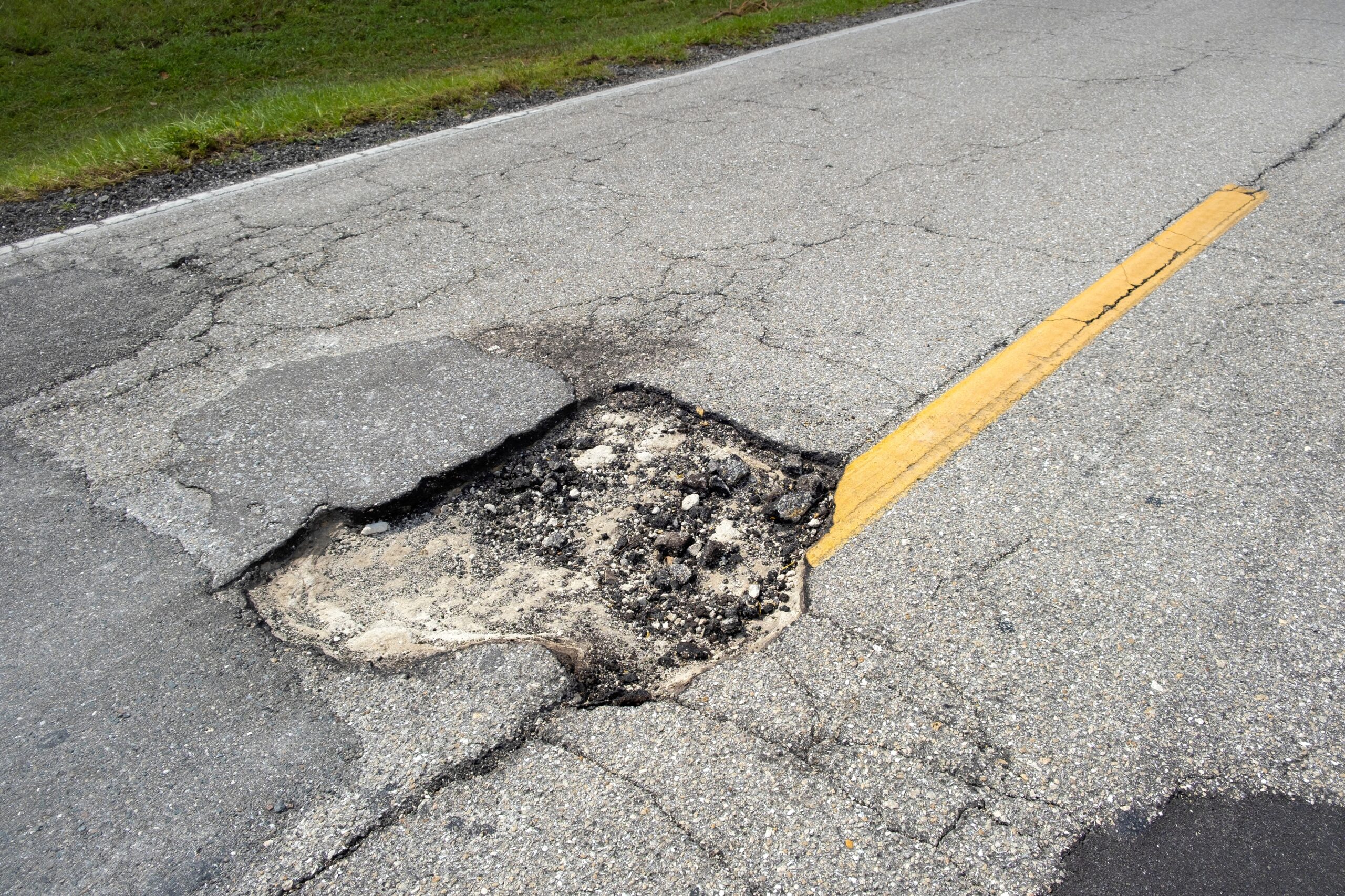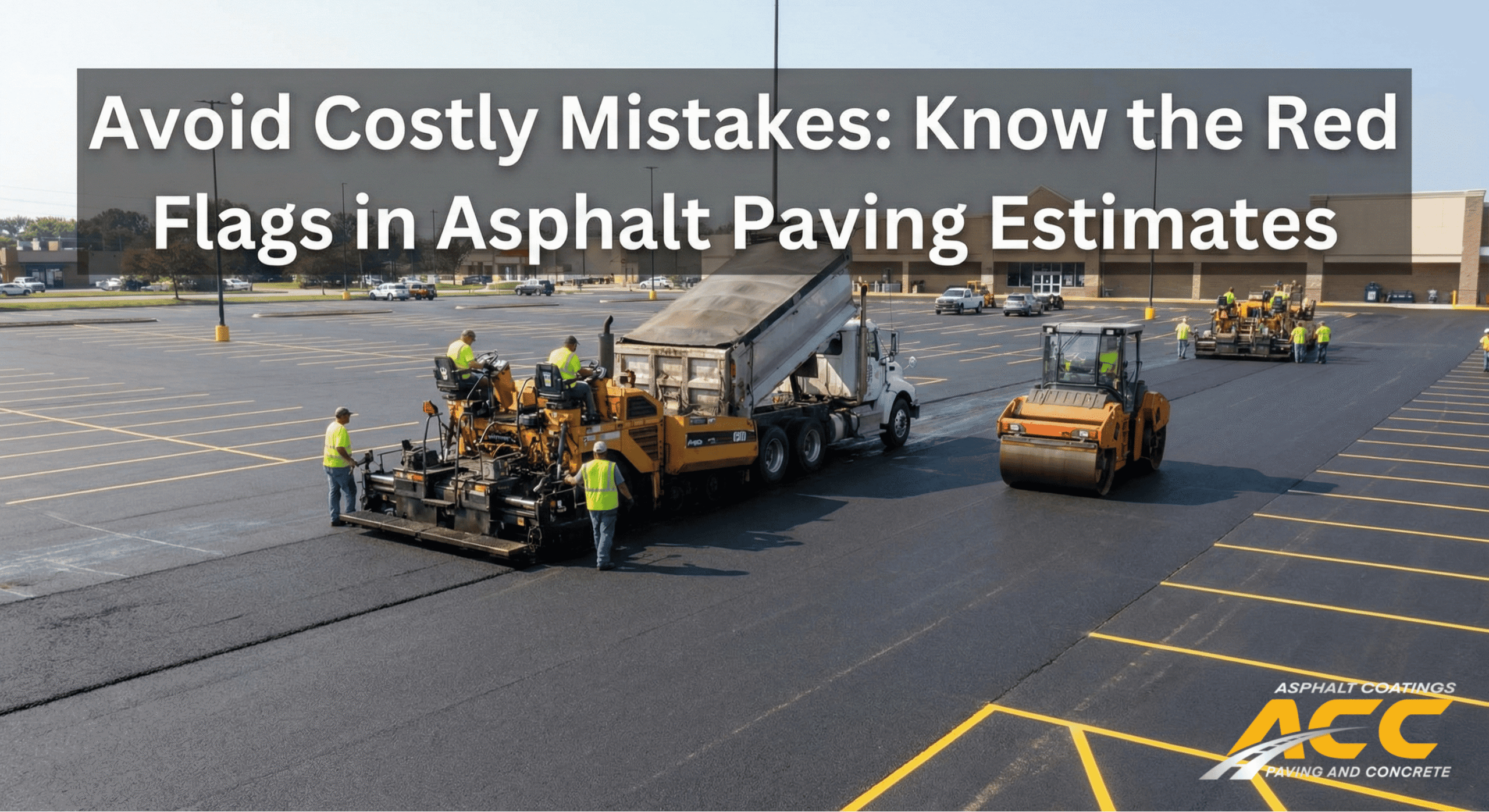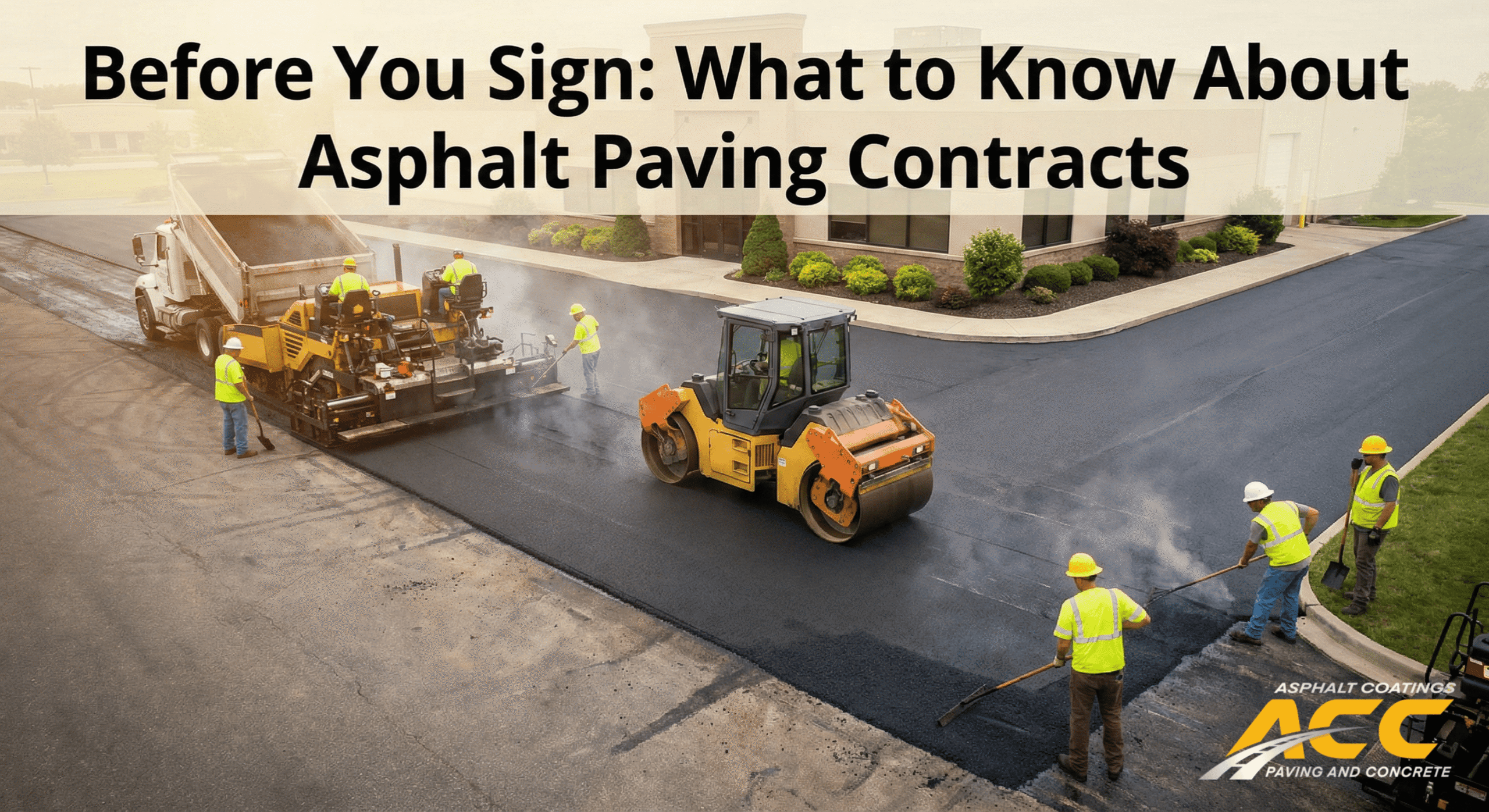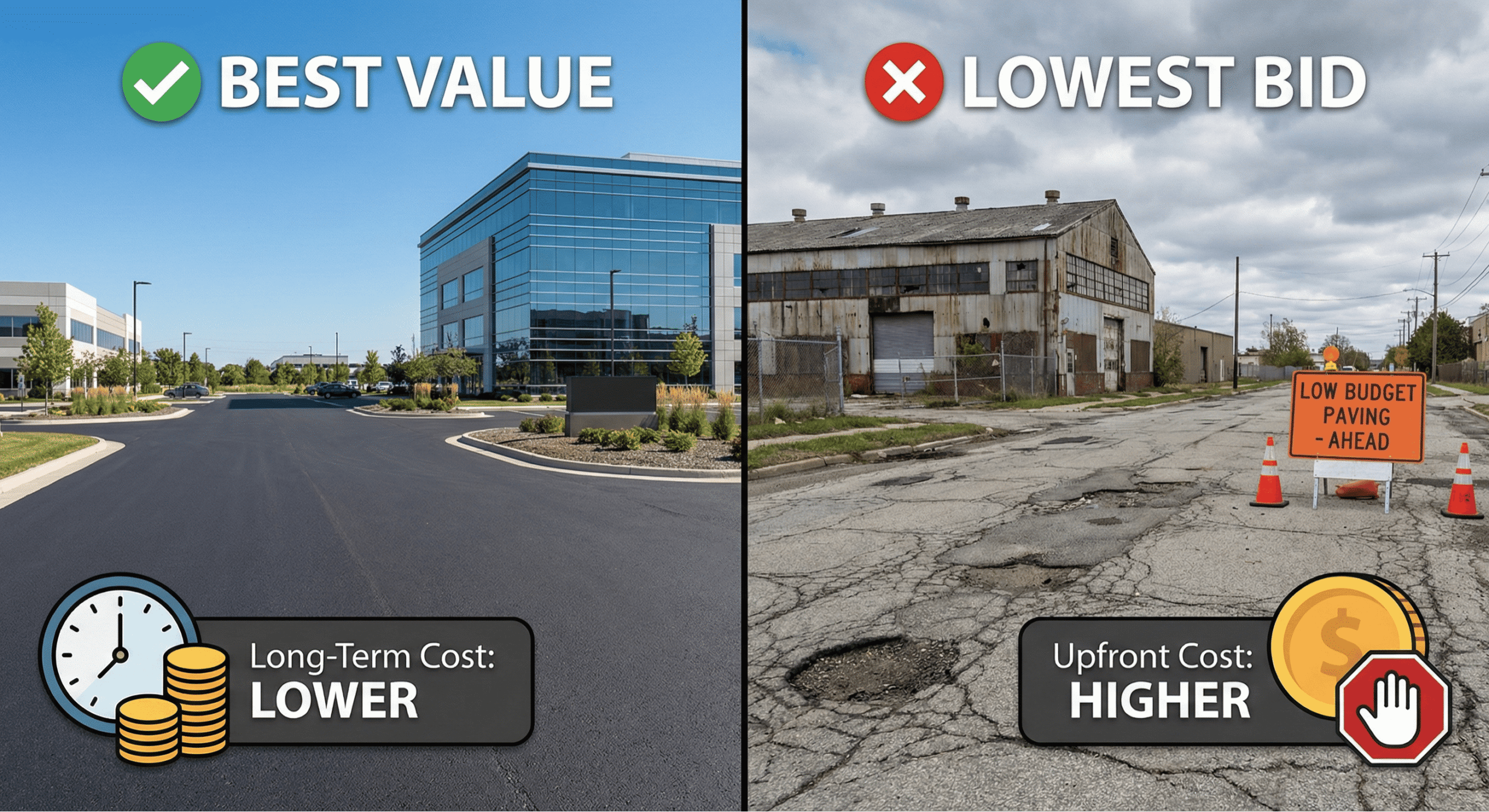
When it comes to asphalt paving, what lies beneath the surface is just as crucial as the blacktop you see. Poor soil can quickly deteriorate asphalt, leading to costly cracks, surface failures, and hazardous unevenness.
Property owners often overlook this critical factor, only to face expensive repairs later. However, the good news is that these problems are preventable. In this guide, we’ll explain how poor soil can damage asphalt and share proven steps to prevent it, protecting your investment from the ground up.
Why Bad Soil Can Ruin Asphalt
Asphalt durability depends on the strength of the soil subgrade beneath the pavement. If the soil isn’t properly prepared, even the best asphalt will deteriorate quickly. Common soil problems include expansive clay, poor compaction, and high moisture content. These conditions lead to cracks, potholes, sinking, and structural failure over time, which is why you must know how to prepare your property for asphalt construction.
The result? Premature repairs, safety hazards, and higher long-term maintenance costs. Ensuring a solid soil foundation is not optional; it’s essential.
What Types of Bad Soil Destroy Asphalt?
Understanding soil composition is the first defense against asphalt damage. Let’s examine the common culprits:
Clay-Heavy Soils
Clay soils expand when they are wet and shrink when they are dry. This constant movement stresses asphalt, leading to cracks and surface instability. Properties built on clay-rich soil often see early pavement failures.
Unstable, Loose Soils
Sandy or poorly compacted soils lack the density to support asphalt. Over time, this causes the pavement to sink, settle unevenly, or develop soft spots. To prevent this, proper execution of the steps to building a strong asphalt parking lot is essential.
Wet, Poorly Draining Soils
Excess moisture undermines soil strength, causing asphalt to shift, heave, or collapse. Poor drainage around paved areas exacerbates the problem, particularly after heavy rainfall.
Warning Signs Your Soil Isn’t Suitable
Before asphalt installation, evaluating soil conditions can prevent expensive surprises. Here’s what to watch for:
Mushy, Loose, or Overly Dry Soil
One of the most apparent indicators of unsuitable soil is when the ground feels unstable underfoot. If the soil is excessively soft, mushy, or powdery, it cannot provide the necessary structural support for asphalt pavement. Such weak soil fails to distribute loads evenly, which eventually leads to cracking, settlement, and deformation of the paved surface. This is often the case with soils that contain a high percentage of organic matter, excessive moisture or lack proper compaction.
Water Pooling or Poor Drainage
Water accumulation near or on the project site is a clear warning sign of poor drainage. When soil does not allow water to drain effectively, it remains saturated, weakening its load-bearing capacity.
Over time, excessive moisture can erode the soil, cause it to shift, or soften the subgrade, all of which significantly increase the likelihood of asphalt failure. Areas prone to pooling water should be corrected before any paving begins to ensure the asphalt remains stable and durable.
Early Cracking or Movement
If existing pavement displays visible cracks, ruts, uneven sections, or noticeable surface movement, these are strong indicators of underlying soil problems. Cracking and displacement can result from soil settlement, moisture fluctuations, or inadequate compaction beneath the asphalt layer.
Early signs of these issues should never be ignored, as they will only worsen over time, leading to more costly repairs and potentially complete pavement replacement.
Quick DIY Soil Checks
You can perform a few simple checks yourself to assess the suitability of the soil. Start by digging a small hole and observe whether the soil crumbles easily or stays soggy; both are signs of poor soil structure. Next, pour some water into the hole to see if it drains properly or pools on the surface, which may indicate drainage issues. Finally, take a handful of soil and compact it. If it fails to hold its shape, the soil lacks the necessary stability to support asphalt.
If these quick checks reveal concerns, it’s essential to arrange professional soil testing before proceeding with asphalt installation.
Soil Testing: The First Step to Avoid Asphalt Failure
Before paving begins, comprehensive soil testing identifies risks and informs proper preparation. At Asphalt Coatings Company, this step is standard practice; here’s why:
What is Soil Testing for Asphalt Projects?
Soil testing is a critical step in any asphalt project, as it determines whether the subgrade, the soil foundation beneath the pavement, is suitable to support asphalt. Through soil testing, experts evaluate the strength, moisture levels, and composition of the soil to identify potential problems that could lead to pavement failure.
Standard Soil Tests for Asphalt Preparation
The following are standard tests performed to assess soil quality:
- Proctor Compaction Test
This test measures the soil’s ability to be compacted to an optimal density. Proper compaction is essential for creating a strong, stable foundation that supports asphalt layers and prevents settling.
- Moisture Content Test
Excess water in the soil weakens its structure. This test determines whether the soil has acceptable moisture levels for construction. If the moisture is too high, corrective action must be taken before paving.
- Soil Classification
Soils are categorized based on their composition, such as clay, sand, or silt, to predict how they will behave under load. Identifying soil type allows contractors to adjust preparation methods accordingly to ensure stability and long-term asphalt performance.
Asphalt Coatings Company’s Testing Approach
We conduct detailed soil analysis to tailor site preparation to each project’s unique needs. Our team ensures that only stable, compacted soil forms the base of your asphalt surface.
Why Soil Testing Matters
Skipping soil testing risks premature failures, higher costs, and safety issues. Knowing your soil’s condition avoids guesswork and guarantees long-lasting pavement.
Best Practices to Avoid Bad Soil Problems
Quality asphalt begins with proper groundwork, and avoiding pitfalls in the soil is essential to ensure long-term pavement performance. Neglecting soil preparation often results in structural problems that are costly to repair. Here’s how to set your asphalt project up for success:
Remove Unsuitable Soil Layers
The first step is removing any unsuitable soil from the construction area. Soils with high clay content, excessive moisture, high organic matter, or loose and unstable properties must be excavated and treated. These materials lack the strength necessary to support asphalt surfaces, which can lead to cracks, depressions, and uneven settlement over time. Removing these weak layers ensures that only strong, stable soils remain as the foundation.
Install Proper Base Aggregates
After unsuitable soil is removed, it’s critical to install proper base aggregates to reinforce the subgrade. High-quality crushed stone or gravel is typically used to create a strong, load-bearing layer. These aggregates help distribute the weight of traffic evenly and prevent soil movement. The quality of the base layer directly affects the durability and resilience of the asphalt, making this step one of the most essential parts of the project.
Compact Soil in Layers
Compacting soil and aggregate materials in thin, manageable layers is vital for building density and strength. Each layer should be compacted thoroughly before the next is added. Proper compaction eliminates air gaps, reduces the risk of settlement, and creates a firm, stable platform for asphalt installation. Failing to compact soil adequately can cause the pavement to shift, sink, or develop soft spots, resulting in premature failure.
Maintain Drainage for Long-Term Success
Good drainage is essential for preserving soil integrity and maintaining asphalt stability. Water that pools around paved areas or infiltrates the subgrade weakens the soil structure, leading to heaving, cracking, and premature damage. Drainage solutions such as sloping the surface away from paved areas, installing drainage channels, or adding proper grading help keep water away from vulnerable soil layers. Long-term pavement performance depends on controlling moisture effectively.
At every stage of construction, attention to detail and adherence to best practices prevent costly asphalt failures. Proper soil preparation is an investment that pays off in durability, safety, and reduced maintenance needs.
How Asphalt Coatings Company Ensures Solid Foundations
At Asphalt Coatings Company, we recognize that poor soil is a hidden threat to your pavement investment. That’s why we focus on building solid foundations:
Our Soil Evaluation Process
- Comprehensive site assessment
- Professional soil testing
- Custom preparation plans
Proven Subgrade Preparation Techniques
- Removal of unsuitable soil
- Installation of engineered base layers
- Layer-by-layer compaction
DIY or Hire a Pro? Avoid Costly Asphalt Mistakes
Paving may seem straightforward, but soil preparation is a complex process that requires knowledge, precision, and the right equipment. Mistakes during this stage often lead to long-term asphalt failure, which is far more expensive to fix than doing it right the first time.
Risks of Cutting Corners
Skipping or rushing through soil preparation is one of the most common causes of asphalt problems. Without proper excavation, soil stabilization, and compaction, the pavement surface is vulnerable to cracking, sinking, and premature deterioration.
Property owners who attempt DIY soil work often underestimate the importance of subgrade strength, resulting in costly repairs, safety hazards, and a reduced pavement lifespan.
When DIY is Acceptable
In rare cases, small asphalt patches or temporary surface fixes might be manageable as a DIY project, provided the underlying soil is already stable. However, even minor asphalt repairs can fail quickly if the soil conditions are not adequately addressed. Complete asphalt installations, commercial paving projects, or any site with questionable soil stability should always involve professional assessment and preparation.
Benefits of Hiring an Asphalt Coatings Company
Choosing the right paving contractor is the best way to avoid soil-related asphalt failures. Asphalt Coatings Company provides comprehensive expertise to ensure a reliable and long-lasting surface.
Expert Soil Analysis
Our team begins every project with a thorough soil evaluation, identifying issues such as poor drainage, high clay content, or weak, loose soil. This enables us to design customized solutions that address potential subgrade issues before asphalt is installed.
Reliable Subgrade Stabilization
We use proven methods to stabilize weak soils, including removing unsuitable material, adding engineered aggregates, and compacting the base in layers. Our equipment and experienced crews ensure the subgrade meets strict density and stability requirements.
High-Quality, Lasting Asphalt Surfaces
With proper soil preparation complete, we install durable, smooth asphalt surfaces designed to withstand traffic, weather, and the test of time. Our commitment to quality reduces the risk of cracking, potholes, and uneven settlement, protecting your investment for years.
Peace of Mind and Long-Term Savings
Hiring Asphalt Coatings Company means fewer future repairs, greater pavement durability, and confidence that your project is built to last. We combine technical expertise with trusted service to deliver results that outperform shortcuts or DIY approaches.
The Cost of Ignoring Soil Problems
Overlooking bad soil might seem like a money-saver, but the reality is different:
- Poor soil causes cracks, potholes, and uneven surfaces.
- Premature asphalt replacement costs far more than proper prep.
- Hidden dangers include drainage failures and safety hazards.
Addressing soil issues upfront saves significant money and headaches.
Frequently Asked Questions
How does bad soil ruin asphalt?
Poor soil quality causes the ground to shift or retain excess moisture, leading to surface cracks, potholes, and premature asphalt failure. Over time, these weaknesses compromise the structure and reduce pavement lifespan.
What is the most common problematic soil found beneath asphalt?
Expansive clay and poorly drained soils are the most significant threats to the area. These soils shift with changes in moisture or trap water beneath the surface, destabilizing the pavement above.
Can bad soil be fixed before asphalt paving?
Yes, poor soil can be excavated, stabilized with lime or cement, and replaced with a proper base layer. This process ensures a strong, stable foundation for long-lasting asphalt.
How do I know if my soil needs to be tested?
Signs such as pooling water, ground movement, or surface cracks indicate the need for soil testing. A professional evaluation confirms if stabilization is required before paving begins.
Does Asphalt Coatings Company handle soil prep?
Absolutely. We manage everything from testing to complete site stabilization.
Common Soil Problems and Asphalt Risks
Properly understanding your soil type is crucial to ensure long-lasting asphalt performance. Below are common soil-related issues and the potential risks they pose to asphalt paving projects:
| Soil Type | Problem | Asphalt Risk |
| Clay-heavy soils | Expand/contract with moisture | Cracks, instability |
| Loose, sandy soils | Poor compaction, instability | Sinking, soft spots |
| Wet, poorly draining | Excess moisture weakens the subgrade | Shifting, heaving, and collapsing |
| Unstable mixed soils | Inconsistent support | Uneven surface, premature wear |
Protect Your Asphalt Investment with Asphalt Coatings Company
Don’t let bad soil undermine your asphalt project. The team at Asphalt Coatings Company has decades of experience building strong, stable foundations for lasting pavement. From soil testing to expert preparation, we handle every detail to ensure your asphalt remains durable, safe, and attractive for years to come.
Ready to start your project, right? Contact Asphalt Coatings Company today for professional soil evaluation and quality paving you can trust.



